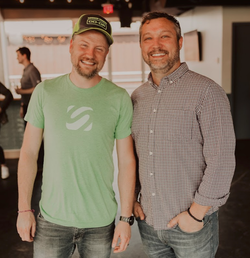Ten Years at Stratasan: A Retro
In May of 2021, it will be ten years since we started Stratasan. Even though the Stratasan adventure is far from over, it seems as good a time as any to write up a retrospective.
Wait… what’s a Stratasan?
Stratasan is a company I co-founded with Jason Moore in 2011. 1 We help healthcare companies (usually acute care hospitals) see what’s going on in their market. Where should they build outpatient clinics? What specialists should they hire, given demographic changes in their market? We also work to collect healthcare data from facilities to report to various entities (e.g., a state Department of Health or a hospital association) and to use for business intelligence.
Was it what I expected?
Yes and no. When Jason asked if I would come on full time, I said two things: I saw it as a great opportunity to learn some new things, and I didn’t figure I would be a good fit for technical leadership once the company grew to more than six or so employees.
The former was accurate! The latter remains to be seen. We’re at about seventy people now and I still feel like I’m contributing value. But, of course, I would say that, wouldn’t I?
What do you know how that you wish you’d known then?
Management is it’s own discipline, worthy of study itself.
In the beginning, I wrote a lot of code. Pretty quickly, I hired another engineer (the very capable Matt George) and worked alongside someone who was a much better developer than myself. Over a few short years, we built a crack team of engineers that included some top-caliber folks like Jason Myers and Will Golden. During that time, I still saw myself as a developer first, and a team lead secondly. I considered the term “manager” as a pejorative and thus did not feel it was necessary for me to educate myself on what it meant to be a manager. After all, I had a degree in Business Administration, so I already knew what that meant, right?
Wrong. Management is it’s own discipline. It took me probably four to five years to properly understand just how different that discipline was from the craft of software development. When I say “management” I don’t mean “business management”. I mean it in the Andrew Grove sense of the term: being responsible for growing the output of my team. Manager as enabler: removing impediments (often in the form of bad processes), keeping the team healthy, etc.
I still feel that having some technical expertise is helpful if you’re going to be responsible for the technical side of a product company, but it’s less important than the ability to solve problems (a talent most developers have in spades!), have healthy and honest conversations, and communicate a vision that everyone can be excited about.
Product management is hard.
When you start a company, you wear all of the hats. As you hire people, you get to hand off some of those hats to folks who do that job well. Among the many hats I’ve worn (developer, security guy, IT support, compliance expert, reader-of-contracts…) product manager is one of the hardest. Being a product manager is a mess of vision casting, strategic planning, data analysis, and domain expertise. Furthermore, it is a company nexus that sits between sales, development, and the C-suite’s future vision. It has tension with everyone because you have to balance capacity with endless ideas. Someone has to be told “no.” Not everyone takes it well.
We still have a lot of work to do on this front. The hardest thing about a growing company (even one that is growing organically and relatively steadily) is that the needs of the day are constantly changing. The minute you think you’ve gotten the organizational structure in a sweet spot, something new happens.
Would you do it again?
Absolutely. But only with the exact same people.
I have said this many times in person, but the two things that I’ve enjoyed the most about the whole ride are, in this order:
- The people I have gotten to work with.
- The problems I get to solve.
There’s a reason I still list “Problem Solving” as my job title on LinkedIn. It’s what got me into software development, and why I’m still here.
Other Important Things
Shared values are paramount.

Jason & Brian @ Stratasan's 8th Anniversary
Jason deserves most of the credit for Stratasan’s success. What convinced me to work with Jason was not his winsome ways (although they are pretty winsome!). It was his shared values. It’s what made our relationship work not just in the short term while we’re figuring things out, but also in the long term: even in the valley of entrepreneurial despair.
Jason’s core values have a significant impact on Stratasan’s core values. It was important that his values align with the entire leadership team, including mine. Otherwise there will be irreconcilable differences in how we think about business.
The leadership team benefits from having technical and product expertise.
Having a technical expert in leadership is important. (Of course, I would say that, wouldn’t I?)
Having someone with even a modicum of technical background in the same room as the board has been helpful for us. Being able to hear about concerns, trends, and strategies straight from the investors is critical. Companies are always talking about organizational alignment - and for good reasons! If you’re a product company, you should put your product people in the same room with your business operations and domain experts. Why? Because product people are great at problem solving. Often your investors will be most familiar with the business problems at hand (that’s why they’re willing to put up money and embrace the risk of backing a startup!). The less layers you have between your top technical/product leadership and the board, the better.
What does the future hold?

We're already a much larger group two years after this photo!
I wish I knew! When we started the company, I told Jason that I probably wouldn’t stick around for very long. I assumed that by the time we hit six employees, I would probably be doing something else. Ten years later and seventy people and I’m still loving every minute of it. I can’t wait to see what the next decade looks like!
–
-
There were actually three co-founders (the third being Tod Fetherling) but Tod exited the company fairly early to start Perception Health. ↩
